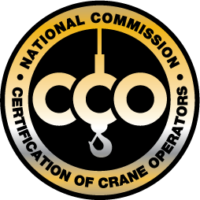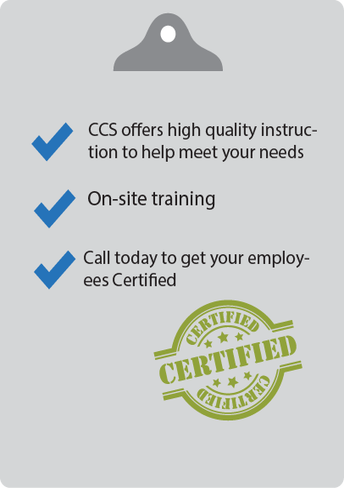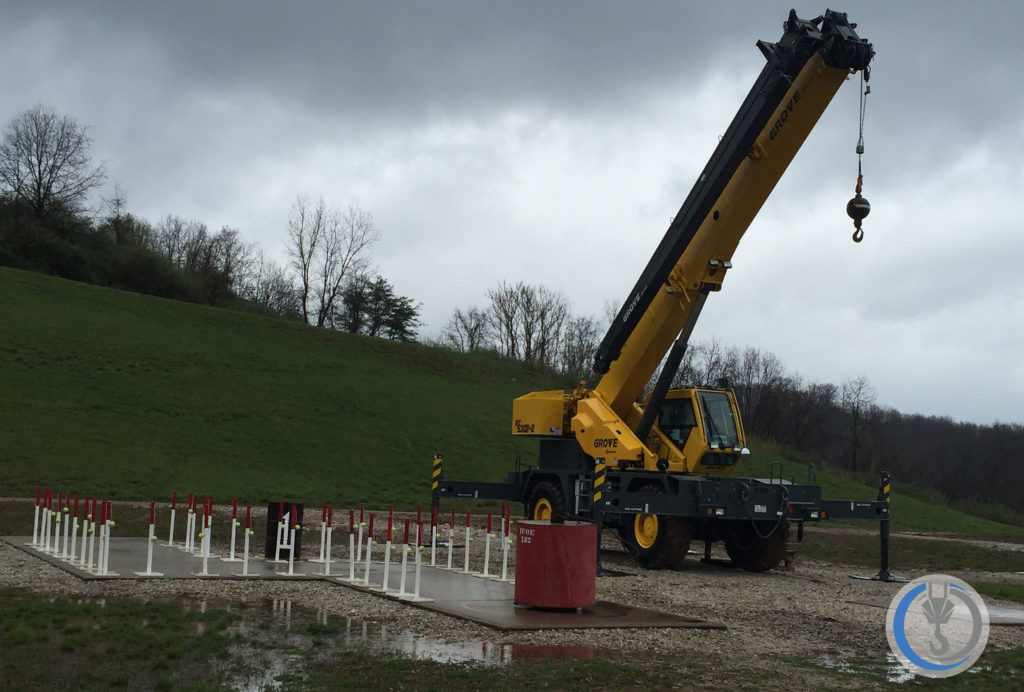NCCCO Training and Testing
CCS offers Training and Testing for NCCCO Certification, an ANSI accredited testing agency. NCCCO’s goal is to provided workplace safety initiatives, reduce occupational risks, improve performance records, stimulate training, and give due recognition to the professionals who work with, and around cranes. Here at CCS we are accredited to conduct the testing with NCCCO in the following programs:


CCS fully endorses the national certification program offered by the National Commission for the Certification of Crane Operators (NCCCO) and provides training to prepare candidates for CCO examinations.
NCCCO Testing
NCCCO Testing consists of a Written Exam and a Practical Exam. In order to take the exams you must:



Crane Certification Solutions instructors are NCCCO Certified Mobile Crane operators that are also NCCCO Accredited Mobile Crane Practical Examiners. CCS has the capability to prepare your employees to become NCCCO Mobile Crane Certified Operators. We also are able to conduct the required NCCCO Mobile Crane Practical Exams for the type of crane or cranes at your location.
NCCCO Mobile Crane Testing procedure consists of both Written (core and specialty exams) and Practical exams. The Core Examination portion of the NCCCO certification program tests the following knowledge areas (e.g. Site, Operations, Technical Knowledge, and Load Charts) relating to Mobile Cranes:
The Specialty Examinations for NCCCO certification program test the following knowledge areas relating to the operation of each of these types of cranes:
- Lattice Boom Truck Cranes (LBT)
- Lattice Boom Crawler Crane (LBC)
- Telescope Boom Cranes – Swing Cab (TLL)
- Telescope Boom Cranes – Fixed Cab (TSS)
- Boom Truck – Fixed Cab (BTF)
Each Specialty Exam only contains questions relevant to cranes within that specialty area. For example, questions about lattice booms will appear on LBT and LBC exams, but will NOT appear on the TLL or TSS exams. Note that the BTF exam will only cover questions relevant to boom trucks.
The Practical Exam consists of evaluating the operator’s skill on the crane itself. The Practical Exam is broken into 6 parts:
- Pre-Operational Inspection
- Place overhead ball in stop circle
- Follow hand signals
- Place overhead ball in 2 barrels
- Navigate a zigzag corridor with test weight in forward and reverse
- Safe Shutdown and Securing Procedures

This course will cover what’s required to successfully pass NCCCO Articulating Crane certification exams and provide new knowledge and skills to address safe work practices on the job. This certification will also satisfy OSHA’s requirements for construction, and general industry, while providing necessary information to keep your workplace safe. The major topics include Site and Setup, Operations, Technical Knowledge, and Load Charts.
After the preparation and training, Crane Certification Solutions will facilitate the Written and Practical Exams required for certification. The NCCCO certification is for a 5-year period after candidates have passed the Written exam of their choice and at least 1 corresponding Practical Exam. The Written exam consists of 3 exams options. Candidates choose from these based on the certification designation(s) they seek. Candidates are giving 90 minutes to complete each of the Written exams:
- Articulating Boom Crane (ABC) – 65 Questions
- Articulating Boom Crane w/ Winch (ABW) – 75 Questions
- Articulating Boom Loader (ABL) – 50 Questions
The Practical exam demonstrates crane operator proficiency and is available for 2 types of cranes:
- Articulating Boom Cranes (ABC)
- Articulating Boom Loaders (ABL)
** Please refer the the Chart below to help you know what exams are needed

NCCCO Written Examination consists of a single exam in Overhead Crane operation. This exam has 60 multiple-choice questions. Candidates are allowed 60 minutes to complete the Overhead Crane Operator Written Exam. The Practical Examination demonstrates crane proficiency and may be taken on either of the following crane types:
- Cab-operated
- Pendant/Remote Control
The Practical Exam tasks are:
- Pre-Operational (shift) Inspection
- True Vertical Lift
- Place Load in Crane #1
- Negotiate Right Angle Corridor with Obstruction
- Trolley Laydown
- Safe Securing Procedures
OSHA 29 CFR 1926 Subpart CC Mobile Crane and Derrick standard, section 1926.1425 requires that all personnel that will preform rigging must be at a minimum “qualified” to do so. OSHA 1926.1425 states that all personnel that will be either hooking, unhooking, or guiding a load in the “Fall Zone” must be trained.
NCCCO Certified Rigger Level 1 can preform simple, repetitive rigging tasks when the load weight, center of gravity, and the rigging configuration are provided to the rigger through experience or on-the-job training prior to the rigging activities. Level 1 Riggers should be able to demonstrated or have the knowledge of how to:
- Inspect rigging before use
- Identify and attach rigging with basic knowledge of hitch configurations, and capacities
- Use various types of rigging equipment and basic hitches with correct application
- Tie basic Knots
The Certified Rigger Level 1 Written Examination consists of 60 multiple-choice questions. The Rigger Level 1 Practical Examination consists of 4 tasks:
- Pre-Use Rigging Inspection
- Rigging Hitches
- Rigging Connections
- Basic Knots
NCCCO Digger Derrick Operator Written Examination has 75 multiple-choice questions. Candidates are allowed 90 minutes to complete the Written Exam. The Practical Examination has 7 tasks with time limits on 4 individual tasks. The 7 tasks that make up the Practical Exam are:
- Pre-Operational Inspection Checklist
- Place Chain in Circle
- Follow Hand Signals
- Negotiate Corridor with Test Weight
- Auger a Hole
- Pick up a Pole
- Stow Boom and Shut-Down Procedures
A boom truck (commercial truck-mounted crane) is defined as a crane consisting of a rotating superstructure (center post or turntable), a fixed or telescope boom, operating machinery, and one or more operator’s stations mounted on a frame attached to a commercial truck chassis with a payload hauling capability whose power source powers the crane. Its function is to lift, lower, and swing loads at various radii, requiring the use of outriggers/stabilizers.
NCCCO has developed a Boom Truck Fixed Cab category (BTF) to test the knowledge and skill set specifically for the Boom Truck operator. The Core Examination has 90 multiple-choice questions. Candidates are allowed 90 minutes to complete the Core Exam. The Boom Truck Specialty Examinations consists of 26 multiple-choice questions. Candidates are allowed 60 minutes to complete the Specialty Exams.
The Occupational Safety and Health Administration (OSHA) enacted 1926 Subpart CC in November 2010, the most extensive Crane Safety Standard. The standard, which includes 1926.1419-1422 and 1428, requires that each signal person must: know and understand the type of signal used, be competent in the application of the type of signals used, and have a basic understanding of the equipment operation and limitations. They must also demonstrate that they meet the requirements through an Oral or Written test, and through a Practical test.